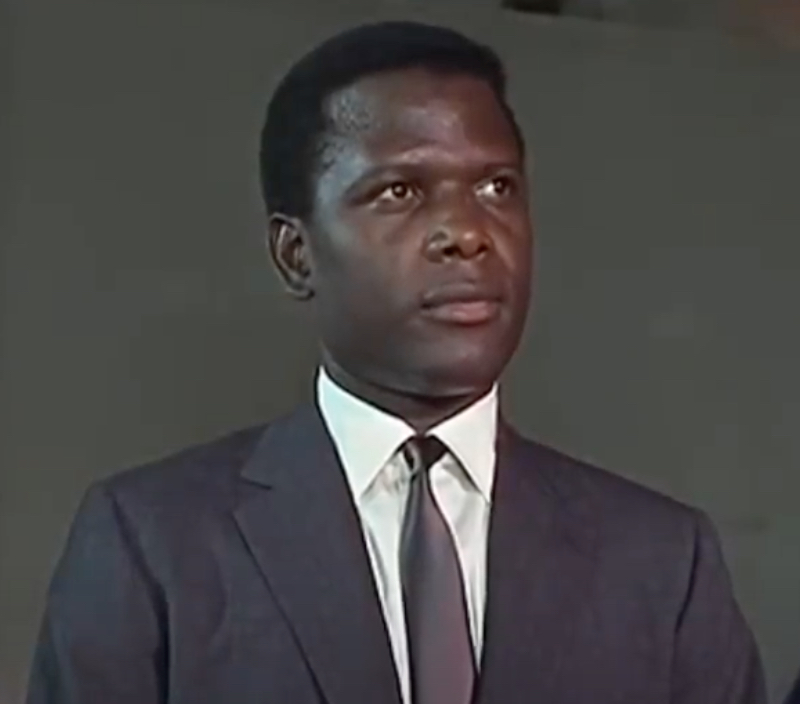Sidney Poitier, Trailblazer Who Became First Black Man to Win Oscar For Best Actor, Dies
by Best Classic Bands StaffSidney Poitier, the trailblazing actor and activist who became the first Black actor to win the Academy Award for Best Actor, for his 1963 role in Lilies of the Field, died yesterday (January 6, 2022), at age 94. His passing was announced on Jan. 7 by the Ministry of Foreign Affairs in the Bahamas, where Mr. Poitier was raised, and died. The cause of death has yet to be revealed.
Among the many other honors Poitier received were an Honorary Academy Award in 2001, a BAFTA award, the Presidential Medal of Freedom in 2009. He was a Kennedy Center Honoree in 1995. In 1974, he was named an Honorary Knight Commander of the Order of the British Empire.
For 20 years, beginning in the early ’50s, Poitier was the top and virtually sole African-American film star. He was the first Black actor to win a prestigious international film award (Venice Film Festival, Something of Value, 1957), the first to be nominated for a Best Actor Academy Award (The Defiant Ones, 1958), the first to star as a romantic lead (Paris Blues, 1961), the first to win the Oscar (Lilies of the Field, 1963).
Poitier was the first Black actor to become the number one box-office star in the country (1968), and the first to insist on a film crew that was at least 50 percent African-American (The Lost Man, 1969).
BREAKING: Beloved Bahamian actor and former ambassador Sir Sidney Poitier has died. He was 94. A Broadway play about the trailblazing career of the visionary actor was announced last month. Sir Sidney’s death was confirmed by Minister of Foreign Affairs Fred Mitchell. pic.twitter.com/WVJFlog3tC
— Eyewitness News Bahamas (@ewnewsbahamas) January 7, 2022
Poitier also starred in the first mainstream movies to condone interracial marriages and permit a mixed couple to hug and kiss (Guess Who’s Coming to Dinner, 1967) and to attack apartheid (The Wilby Conspiracy, 1975). The New York Times‘ Vincent Canby once wrote, “Poitier does not make movies, he makes milestones.”
He was born February 20, 1927, in Miami, Florida, and raised as the seventh and last child of parents who were poor tomato farmers in the Bahamas. By the age of 13, he was working full-time to support the family. At 16, he arrived in New York City, and ultimately lied about his age to join the U.S. Army during World War II. Back in New York he got a job as a dishwasher and stumbled into acting. While looking for a second job to make ends meet, he came across an ad calling for actors. Without any experience or training, he auditioned for the American Negro Theatre. He was humiliated off the stage, but six months later, better prepared, he auditioned again. Later at 22, he earned his first film in No Way Out, directed by Joseph L. Mankiewicz, that launched his career.
Sidney was my inspiration, my guiding light, my friend. Sending love to Joanna and his family. pic.twitter.com/0UzVIyeJZV
— Morgan Freeman (@morgan_freeman) January 7, 2022
His star continued to grow in such landmark films as Cry the Beloved Country (1952), Blackboard Jungle (1955), A Raisin in the Sun (1961), which he was instrumental in bringing to the stage and film; The Bedford Incident (1965), A Patch of Blue (1965), The Slender Thread (1965), and To Sir, With Love (1967).
Watch the emotional closing scene
Related: The film’s title track was one of the #1 singles of 1967
Scottish singer Lulu, who also starred in the movie, and sang the title track, said, “Sidney you were my friend , my teacher , my inspiration….
“Sir rises above the fray and leads by example”…
This was how you lived your life.
You empowered and educated us do we could choose to follow your lead!
RIP dear man.😔♥️😌”
In 1967’s In the Heat of the Night, his character confronts a condescending Southern sheriff with the line heard round the world, “They call me Mister Tibbs.”
Poitier’s characters are described as men of control, who tame volcanic rage with reason and intellect.
At the peak of his career in front of the camera, Poitier decided to direct as well. His first film, Buck and Preacher (1972), starred two good friends from his American Negro Theatre days–Harry Belafonte and Ruby Dee. With Paul Newman, Barbra Streisand, and Steve McQueen, he formed the independent First Artist Production Company. Uptown Saturday Night (1974) was the first of several box office comedy hits helmed by Poitier and featuring largely black casts.
This is a big one. No words can describe how your work radically shifted my life. The dignity, normalcy, strength, excellence and sheer electricity you brought to your roles showed us that we, as Black folks, mattered!!! It was an honor… https://t.co/xaPAjAlRtR pic.twitter.com/aqOmRqq7SN
— Viola Davis (@violadavis) January 7, 2022
In 1980, he directed the the classic comedy film, Stir Crazy, with Gene Wilder and Richard Pryor. In 1991, shortly after ending a decade-long hiatus from acting, Poitier returned to television for the first time in 35 years to portray supreme Court Justice Thurgood Marshall in the Award-winning mini-series Separate but Equal.
Paying tribute to Sidney Poitier in 1967, Dr. Martin Luther King, Jr. said, “He is a man of great depth, a man of great social concern, a man who is dedicated to human rights and freedom. Here is a man who, in the words we so often hear now, is a soul brother.”
Sidney Poitier. What a landmark actor. One of a kind. What a beautiful, gracious, warm, genuinely regal man. RIP, Sir. With love.
(📷Sam Falk/NYT) pic.twitter.com/5ZaKxxPdxw
— Jeffrey Wright (@jfreewright) January 7, 2022
In 2021, Arizona State University announced The New American Film School in the Herberger Institute for Design and the Arts would be named for Poitier.
“Today, the world has lost an icon, and I have lost one of my dearest friends, the great Sidney Poitier. He was a man of grace, integrity and someone I long admired… My condolences go out to his incredible wife, Joanna, and his beautiful girls.”
Berry Gordy
Founder, Motown pic.twitter.com/vKMO2PN4Yv— Classic Motown (@ClassicMotown) January 7, 2022
Poitier is survived by his wife, Joanna Shimkus, with whom he had two daughters. He had four daughters with his first wife, whom he married in 1950. The couple were divorced in 1965.







1 Comment so far
Jump into a conversationChildhood memory of Sidney Poitier, as El Mansuh – Moor ruler im the Saturday afternoon matinee classic from 1964’s “The Long Ships”
“The Mare of Steel” and the “Mother of Voices”
Have been engrained in my memory ever since those Saturday afternoon viewings.
Of course, Mr. Poitier had a distinguished career in many dramatic roles, but (regardless of critics) “The Long Ships” was an entertaining film.